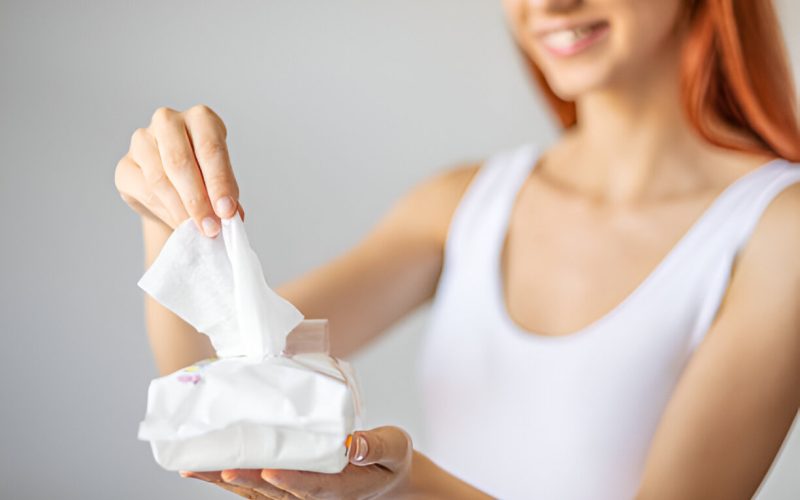For millions of people, sensitive skin isn’t just a minor annoyance—it’s a daily challenge. Harsh soaps, fragrances, and even water quality can trigger redness, itching, or rashes. This is where hypoallergenic body wipes shine. Designed to clean without irritation, these wipes are a lifeline for anyone with delicate skin or allergies. But with so many options on the market, how do you choose the right ones?
In this article, we’ll explore what makes hygiene body wipes different from regular wipes, their benefits, and how to integrate them into your routine safely.
What Are Hypoallergenic Body Wipes?
Hypoallergenic body wipes are cleansing cloths specifically formulated to minimize allergic reactions. Unlike standard wipes, which often contain alcohol, sulfates, or synthetic fragrances, hypoallergenic options use gentle ingredients that respect your skin’s natural barrier.
Key features to look for:
- Fragrance-free: Synthetic scents are a common irritant.
- pH-balanced: Matches skin’s natural acidity (around 5.5).
- Dermatologist-tested: Verified safe for sensitive skin.
- Biodegradable materials: Better for skin and the planet.
Who Needs Hypoallergenic Body Wipes?
These wipes aren’t just for people with diagnosed skin conditions.
They’re ideal for:
- Eczema or psoriasis sufferers: Avoid flare-ups from harsh chemicals.
- New parents: Gentle enough for babies’ skin during diaper changes.
- Athletes: Post-workout cleansing without drying out skin.
- Frequent travelers: Combat “travel skin” from planes and hotels.
- Elderly individuals: Protect thin, fragile skin from irritation.
5 Benefits of Hypoallergenic Body Wipes
1. Reduce Skin Irritation
Traditional wipes often contain preservatives like methylisothiazolinone (MI), which can cause contact dermatitis. Hypoallergenic formulas skip these irritants, using plant-based preservatives like citric acid instead.
2. Safe for Daily Use
Because they’re free from harsh ingredients, these wipes can be used multiple times a day without stripping natural oils.
3. Versatile Applications
Use them for:
- Quick clean-ups after gardening or crafts.
- Wiping down gym equipment before/after use.
- Refreshing skin during heatwaves or menopause.
4. Travel-Friendly
TSA-approved and spill-proof, they’re perfect for freshening up on planes, trains, or road trips.
5. Eco-Conscious Options
Many hypoallergenic wipes use biodegradable bamboo or cotton fibers, reducing plastic waste.
How to Choose the Best Hypoallergenic Body Wipes
Step 1: Check the Ingredients
Avoid these red flags:
- Alcohol (ethanol, isopropyl): Dries out skin.
- Parabens: Linked to hormone disruption.
- Phthalates: Often hidden under “fragrance.”
Look for these green flags:
- Aloe vera: Soothes inflammation.
- Chamomile extract: Calms redness.
- Vitamin E: Locks in moisture.
Step 2: Test the Texture
Thick, soft wipes are less likely to tear or feel abrasive. If shopping online, read reviews about durability.
Step 3: Consider Sustainability
Opt for brands that use recyclable packaging or plant-based fibers.
Pro Tip: Patch-test new wipes on your inner wrist before full-body use.
Common Mistakes When Using Body Wipes
- Using Them on Broken Skin
Even gentle wipes can sting cuts or rashes. Stick to water and mild soap in these cases. - Over-Rubbing
Press and hold the wipe on skin instead of scrubbing to avoid friction. - Skipping Moisturizer
Follow up with a hypoallergenic lotion to keep skin hydrated. - Flushing Wipes
Most wipes aren’t truly flushable and can clog pipes—even biodegradable ones.
When to Avoid Body Wipes Altogether
While hypoallergenic wipes are safer, they’re not a cure-all. Avoid them if:
- You have open wounds or severe burns.
- You’re allergic to specific plant extracts (e.g., tea tree oil).
- You need medical-grade sterilization (use antiseptic solutions instead).
Eco-Friendly Hypoallergenic Wipes: Do They Exist?
Yes! Look for:
- Certifications: USDA Organic, Ecocert, or FSC labels.
- Materials: Bamboo, organic cotton, or wood pulp.
- Packaging: Recyclable or compostable pouches.
Brands like Get WOW Wipes combine hypoallergenic formulas with eco-conscious materials, but always verify claims before buying.
How to Use Hypoallergenic Wipes Effectively
- Post-Workout: Cleanse sweat-prone areas (underarms, back, feet) to prevent odor.
- Travel: Wipe down airplane tray tables, then freshen your hands and face.
- Baby Care: Use unscented wipes for diaper changes or messy meals.
- Hot Weather: Cool down with a wipe stored in the fridge.
FAQs About Hypoallergenic Body Wipes
Can I use these wipes on my face?
Only if they’re explicitly labeled for facial use. Body wipes are thicker and may clog pores.
How long do hypoallergenic wipes last?
Most stay moist for 12–18 months if unopened. Once opened, use within 2–3 months.
Are they safe for pets?
No—stick to pet-specific wipes. Human products may contain harmful essential oils.
Can I compost biodegradable wipes?
Only in industrial compost facilities. Home compost piles may not break them down fully.
The Bottom Line
Hypoallergenic body wipes are more than a trend—they’re a practical solution for anyone seeking gentle, reliable hygiene. Whether you’re managing sensitive skin, traveling, or simply avoiding harsh chemicals, these wipes offer a safe way to stay fresh without compromise.
By choosing products with clean ingredients and sustainable practices, you’re not just caring for your skin—you’re supporting a healthier planet. So next time you restock your hygiene kit, skip the guesswork and opt for wipes that respect your skin and the environment.












